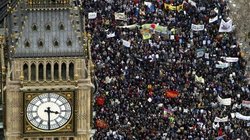 Yesterday’s massive demonstrations against Boris Johnson’s and the Queen’s decision to suspend parliament may well be a harbinger of things to come as Britain moves deeper into unchartered political territory.
Yesterday’s massive demonstrations against Boris Johnson’s and the Queen’s decision to suspend parliament may well be a harbinger of things to come as Britain moves deeper into unchartered political territory. RNA - According to multiple media reports, tens of thousands of people took to the streets across Britain yesterday, August 31, to protest against Johnson’s move to suspend parliament.
The highlight of the day was when thousands of people poured into Downing Street shouting “shame on you” before they proceeded to stop traffic in Trafalgar Square for two hours.
Even The Telegraph – no friend of anti-Brexiteers or people power of any form – had to admit that “protesters” had brought London to a “standstill”.
In the decisive days and weeks ahead more and more people are expected to come onto the streets under the “stop the coup” banner to apply pressure on Johnson’s hard-right Tory administration, and by extension, the Queen, who gave her seal of approval to the prorogation of parliament.
The key question is whether people power at the street level can apply sufficient pressure on the British establishment to change course at the final hour.
The British establishment is clearly worried about the potential of mass demonstrations, and possibly severe unrest, in the run-up to Brexit.
As early as February, Reuters reported that British officials had revived Cold War emergency plans to relocate the Queen and the entire royal family in the event of riots on London’s streets.
Protests, demonstrations and strikes are not familiar scenes on British streets. The British go to great lengths to separate themselves from the political cultures of the continent, specifically the French, by the fact that they don’t often take to the streets to demand political change.
And even in those rare moments when British people have come onto the streets in great numbers, there was no appreciable impact on the political process.
According to Press TV, the best example was the huge protest marches in February 2003 in the run-up to the Iraq War, which witnessed well over a million people swelling the streets of London.
The London marches, widely described as the largest in modern British history, had no impact whatsoever on then Prime Minister Tony Blair’s decision to join the United States in attacking Iraq.
It remains to be seen whether street protests can produce any results this time around.
But the fact that the authorities expect to see riots and disorder on the streets of London – and are even prepared to evacuate the Queen from her capital – speaks volumes about the depth of Britain’s political and constitutional crisis.
847/940